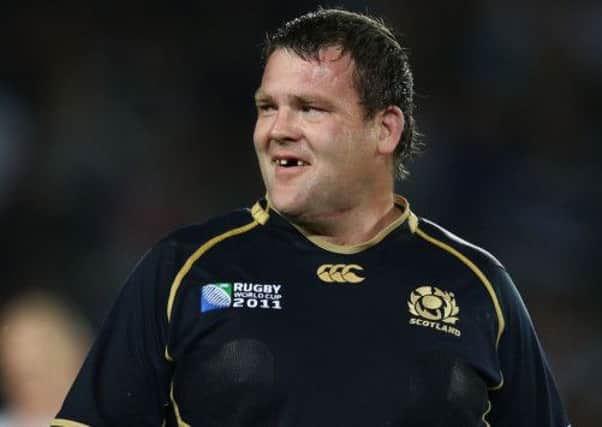Jacobsen to end career at Edinburgh after 16 years


Nicknamed “Chunk” by mini-rugby team-mates on the bus due a likeness with the chubby character in 1980s film The Goonies, the product of Preston Lodge, and his protruding belly, have been the subject of some fun and criticism at times in his career. But, as the 34-year-old called time on his professional career following the announcement made in November that he was stepping down from the international game, it was more what was unsaid than said that mattered.
From the school of “why use four words when one will do”, Jacobsen’s reflections on his career were short and sweet, the great highlights coincidentally revolving around Toulouse and bitter regrets often featuring Ulster. He has grown comfortable in the media spotlight without ever embracing it. Charming and amenable but never voluble. Chunk is Chunk, and yet he has become every bit a legend in Edinburgh and Scottish rugby as the more erudite team-mate and fellow retiree, Chris Paterson.
Advertisement
Hide AdAdvertisement
Hide AdWhy? Largely because of his approach to rugby and life, because of his shape and because he typifies the Scottish spirit as much as any player. The ability to overcome perceived limitations and hold his own on the world stage. Jacobsen will make his 285th and final appearance for Edinburgh against Newport Gwent Dragons next week. He has won 65 caps, the most by a Scotland prop, and come back from injury on several occasions in a career that began as a 16-year-old at Preston Lodge.
He started out just as rugby was turning professional but brought with him a penchant for pies and beer, until training toughened and his ambition was seriously tested. Did he really want to play in a World Cup, asked Frank Hadden. “Then get fitter”, the coach told him.
Jacobsen proved a few people wrong by duly getting fitter than he ever had been, and fitter than more svelte players, only, cruelly, to suffer a calf injury in the opening match against Portugal and be forced out of the tournament. But that summer of sweat in 2007 played a key role in lifting Jacobsen to a new level of performance and, ultimately, taking his career to this point. He feels he has been fortunate, but in recounting highlights shaped by performing against the odds, he acknowledged, too, that hard work was the key to his development into an international player who gained the respects of peers in Scotland and across the globe.
He said: “I feel lucky to have played this long, the people I’ve played with, the teams I’ve played in and games I’ve played in. For me, beating Toulouse, the reigning European champions, at Meadowbank in 2003, which was just such a flip of what the whole world thought was going to happen, was incredible. Then to beat Toulouse in the quarter-finals last season was. . . well, that whole campaign I won’t ever forget. That was unreal.
“People of all different sizes and shapes can still play rugby, but you do have to be fit. I always felt that I was willing to work harder than some other players, and that’s why I survived as long.”
Two players who the SRU brought to Scotland from New Zealand also played a key role, as Jacobsen highlighted Todd Blackadder and Brendan Laney as the best he had ever played with. “Todd was a great player, but he was hard,” said Jacobsen, with clear admiration. “I can’t remember seeing anyone ever get the better of him at anything, while Brendan for Edinburgh was such a good player, so talented, and could do things that I’ve never seen anyone else able to do.
“And he was so influential and knew what to do at the right times. I’d find it impossible to pick between them. But I’ve played with lots of boys from here, too. I watched Mike Blair come into the team when he 20 or whatever, and I’d been there for a few years, and from the start he never looked out of place, and he just got better and better and better.
“And, hopefully, I’ve played my part in helping others. When I was growing up playing at Preston Lodge, and was playing for Edinburgh Under-16s, I would go and watch Edinburgh and loved it. I remember watching Edinburgh playing Tonga and other teams in the 1990s and I’d like to think that kids have come and watched us and, ten years down the line, this will be them.”
Advertisement
Hide AdAdvertisement
Hide AdJacobsen may prove to be a greater role model than most because many youngsters across Scotland will identify with him quicker than some of the more superhuman-like internationalists, and players who have come from abroad. And there is the fact that he remains grounded, to the point that he hopes to watch Edinburgh next season, with his wife Gayle and three-year-old daughter, Maisie. He might consider pulling on the boots again at amateur level, but not before he starts his own business as a plumber.
“When I retired with Scotland I did think I could keep going for years but, as the season has gone on, you look at the fact that you’ve done 16 years on the bounce and I’ve always wanted to do everything, to play and to do all the training you need to to remain at the level you want to be at, but I can’t do that anymore.
“It’s not like my body has just caved in but it’s not going to get any better and knowing I’m going back to my trade, the longer I kept playing the less easy that would be physically.”
Newcastle were interested in Jacobsen bringing his experience to them, but he has followed Paterson’s lead and decided to quit at the top. Like Sir Chris Hoy, too, that only adds to his reputation for good common sense and underlines his qualities as a Scottish rugby hero.